Lorena Bonilla, Gerente de Datos y Analítica, ayuda a Pro LatAm a mantenerse a la vanguardia en una región en desarrollo, en un contexto de evolución constante de la inteligencia artificial (IA).
Lorena Bonilla, actual Gerente de Datos y Analítica para Pro LatAm, ha dedicado la mayor parte de su carrera a lo que más le apasiona: los datos.
Con más de dos décadas de experiencia en el sector asegurador y con formación actuarial, comenzó su trayectoria en Pro Global en octubre de 2021 como Gerente de Consultoría, cargo que ocupó durante poco más de un año y medio antes de ser promovida a su puesto actual.

Como Gerente de Datos y Analítica, Lorena es responsable de guiar las operaciones de la empresa en América Latina. También colabora en la asignación de recursos y en la estrategia, identificando áreas de mejora de la rentabilidad.
Sin embargo, debido a la naturaleza cambiante y diversa de los datos y la regulación en LatAm, los desafíos son inevitables.
Ella explica:
“Me encantan los datos. Pero uno de los desafíos más importantes que enfrentamos como región tiene que ver con la calidad de los datos y su disponibilidad. La calidad de los datos presenta una problemática mixta: uno de los principales problemas es la inconsistente o la disponibilidad limitada de datos de alta calidad. Muchas operaciones en la región de LatAm carecen de un sistema integral de recopilación de datos ya que están obsoletos.”
No obstante, este año LatAm está experimentando un auge significativo en inversiones en centros de datos, y se estima que casi se duplicará en los próximos años, pasando de 5 mil millones de dólares en 2023 a un estimado de 10 mil millones para 2029.
Brasil, México y Chile lideran la expansión regional, aunque países como Colombia, por ejemplo, todavía están emergiendo como centros tecnológicos.
Disparidades regulatorias
También hay variaciones significativas en las regulaciones relacionadas con la inteligencia artificial (IA), la privacidad de los datos y la ciberseguridad.
Por ejemplo, la Ley de Gobierno Digital de Brasil y su plataforma central de intercambio de datos permiten el flujo de información en tiempo real entre agencias gubernamentales. De forma similar, la Ley de Transformación Digital de Chile utiliza plataformas estandarizadas para garantizar la seguridad e interoperabilidad.
Lorena añade:
“En segundo lugar, también existe un entorno regulatorio desafiante en LatAm, que está altamente fragmentado, con disparidades en toda la región. Esto, a su vez, puede complicar la estandarización de datos y el cumplimiento normativo.”
Con respecto a la IA, la región tiene la oportunidad de desarrollar su propio enfoque o seguir el camino de Silicon Valley; una ventaja de contar con un marco normativo definido es que dicho marco atrae inversión.
La Agenda Digital 2024 de la Comisión Económica para América Latina y el Caribe (CEPAL) fue respaldada por los 33 países miembros, y actualmente la regulación en la región sigue siendo fragmentada, con muchos países en diferentes etapas de desarrollo normativo.
El marco más desarrollado en la región parece ser el Proyecto de Regulación de IA de Brasil, que se inspiró en la Ley de IA de la Unión Europea. Este busca introducir obligaciones para los agentes del sistema de IA, como los desarrolladores —ya sean personas físicas o jurídicas— que desarrollen sistemas de inteligencia artificial de forma directa o por encargo.
Transformación digital en crecimiento
La adopción tecnológica es otro desafío para LatAm, ya que la transformación digital en la región avanza a ritmos desiguales.
Lorena comenta:
“Si bien hay un interés creciente en la transformación digital, la adopción de tecnología de analítica avanzada todavía se encuentra en sus primeras etapas en muchas partes de LatAm. Aún queda mucho por hacer.”
Y la región sigue viéndose limitada en parte por los desafíos de los sistemas heredados.
Ella continúa:
“Tenemos algunos sistemas heredados que no están integrados con nuevas tecnologías. Es un gran desafío. Pero existe una oportunidad significativa para aprovechar herramientas digitales y la analítica para mejorar la interacción con los clientes, optimizar operaciones, evaluar riesgos y fomentar la innovación en productos.”
El futuro de los datos y la analítica
Mirando hacia el futuro, Lorena cree que los datos y la analítica crecerán de forma exponencial.
Uno de los principales beneficios del uso de datos y analítica es la posibilidad de crear productos de seguros altamente personalizados, mejorar la experiencia del cliente y ofrecer recomendaciones personalizadas en el proceso de gestión de siniestros.
Además, ayuda a realizar evaluaciones de riesgo y modelos de precios más precisos, así como a mejorar la detección de fraudes.
Por último, destaca las conversaciones en torno al seguro inclusivo en la región, posible gracias a la analítica de datos. Por ejemplo, las aseguradoras pueden diseñar productos para poblaciones desatendidas en la región, como personas de bajos ingresos o pequeños agricultores, haciendo que el seguro sea más accesible.
To speak to the Pro Global team please feel free to reach out to us at:

Name: Lorena Bonilla
Job title: Gerente de Datos y Analítica

To contact our PR team directly please use the link below
Lorena Bonilla, Data and Analytics Manager, helps Pro LatAm stay ahead of the curve in a developing region, against the backdrop of evolving AI
Lorena Bonilla, currently Data and Analytics Manager for Pro LatAm has dedicated the majority of her career to the thing that she is most passionate about – data.
With more than two decades of experience in the insurance sector and coming from an actuary background, she began her journey with Pro Global back in October 2021 as a Consulting Manager – a role that she served for just over one and a half years before being promoted to her current role.

As Data and Analytics Manager, Lorena is responsible for guiding the firm’s operations in LatAm. She also assists with allocating resources and strategy such as identifying areas for profit improvements.
But due to the ever evolving and very different nature of data and regulation in LatAm, challenges are inevitable.
She explains: “I love data. But one of the most important challenges we face as a region is around data quality and what’s available. Data quality presents a mixed picture – one of the main issues being the inconsistent or limited availability of high-quality data. Many operations in the LatAm region lack a comprehensive data collection system because it is outdated.”
However, this year, LatAm is experiencing a significant boom in data centre investment, and it is estimated to almost double in size in the years ahead, growing from $5bn in 2023 to an estimated $10bn by 2029.
And it is Brazil, Mexico and Chile that are leading the regional expansion, although countries like Colombia, for example, are still emerging as tech hubs.
Regulatory disparities
There are also significant changes or variations in regulation such as Artificial Intelligence (AI), data privacy and cyber security.
For example, Brazil’s Digital Government law and its central data-sharing platform, which enables data to flow in real-time across government agencies. Likewise, is Chile’s Digital Transformation Law that uses standardised platforms to ensure security and inter-operability.
Lorena adds: “Secondly, there is also a challenging regularity environment in LatAm, which is highly fragmented with disparities across the region. This in turn can complicate data standardisation and compliance.”
With AI the region has an opportunity to develop its own approach or follow suit with Silicon Valley – one bonus being that having a set framework attracts investment.
The European Commission for Latin America and the Caribbean (ECLAC) 2024 Digital Agenda was endorsed by all 33 member countries, and currently regulation across the region remains fragmented with many countries at different stages.
The most developed framework in the region seems to be Brazil’s draft AI Regulation, which was inspired by the EU AI Act. It aims to introduce obligations following AI system agents, such as an AI system developer – a natural or legal person that developed an AI system, directly or by commission.
Growing digital transformation
Technology adoption is another challenge for LatAm as digital transformation across the region is also developing at different paces.
Lorena says: “While there is growing interest in digital transformation, the adoption of advanced analytical technology is still in its early stages in many parts of LatAm. More work is still needed.”
And LatAm is somewhat still held back by legacy system challenges.
She continues: “We have some legacy systems that are not integrated with new technology. It’s a huge challenge. But there is a significant opportunity to leverage digital tools and analytics to improve customer engagement, streamline operations and optimise risk assessment as well as product innovation.”
Future of data and analytics
Looking to the future of data and analytics, Lorena believes that it will grow exponentially.
One highlight of using data and analytics is that it can be used to create highly personalised insurance products, improved customer experience and personal recommendations in claims processing.
On top of this, it can aid more accurate risk assessments and pricing models as well as improve fraud detection.
Lastly, she notes the discussions around inclusive insurance in the region made possible by data analytics. For example, insurers can design products for the underserved populations in the region such as low-income individuals, small farmers to make insurance more accessible.
To speak to the Pro Global team please feel free to reach out to us at:

Name: Lorena Bonilla
Job title: Data and Analytics Manager

To contact our PR team directly please use the link below
A kind thanks to Insurance Business for allowing us to use this article.
Amid sky-high underwriter attrition and sweeping tech transitions, insurers and MGAs are relying more heavily on external underwriting support to stay operational – and competitive.
“The increased demand for underwriting support services is really down to a convergence of pressures across the market,” said Shayne Caple (pictured), head of underwriting services at Pro Global. “At the core is a talent challenge – experienced underwriters and support staff are in high demand, and attrition remains high.”
In the UK and abroad, these staffing shortfalls are being compounded by major system upgrades and process digitisation. “Change programmes often divert internal resources and, paradoxically, temporarily make resource management more complex,” Caple said. “That’s where external expertise becomes so valuable – not just to keep the wheels turning on business as usual but to help optimise how that new technology is used.”

Workforce gaps meet rising complexity
Many underwriting teams are feeling the squeeze. “Quite frankly, in many cases they’re struggling to cope,” Caple said. “Attrition and extended hiring cycles are putting real pressure on underwriting teams. Layer on top of that a new system rollout or a spike in volume, and the cracks start to show.”
Still, some are making progress by sharpening their use of data and automation. “The insights that emerge from better data can drive smarter decisions, but it still depends on having the right people interpreting that data,” he said.
Internally, Caple sees success with a “grow your own” approach to talent development. And at the industry level, initiatives like the MGAA’s Next Gen programme point to broader efforts to attract and retain underwriting talent in a sustainable way.
Smarter collaboration across the MGA ecosystem
Across the MGA landscape, Pro Global is seeing greater collaboration between MGAs, technology vendors, and operational service providers. “Many providers now rank among the largest users of core market systems, so we’re well placed to support clients through that change,” Caple noted.
He emphasises that scale alone isn’t enough. “There’s increasing demand for specialist knowledge – not just technical skills, but insight into best practice around new systems and data usage,” he said.
At the same time, MGAs are becoming more proactive in how they use management information. “It’s about shifting from a retrospective, month-end view to real-time insights that enable continuous improvement,” Caple said.
Preparing for pressure – and the unexpected
Operational resilience is also in sharper focus. “Given today’s uncertainties – geopolitical risk, high staff turnover, economic volatility – clients are asking for disaster recovery and business continuity options that are both scalable and flexible,” he said.
Looking ahead, Caple believes underwriting support will require a blend of scalability, insight, and trust. “AI and automation are developing fast, but this is a nuanced market,” he said. “You still need people with experience who can interpret that data and turn it into something actionable.”
For carriers and MGAs navigating tighter cycles and growing complexity, support models that offer resource certainty, data reliability, and resilient service delivery won’t just be helpful – they’ll be essential.
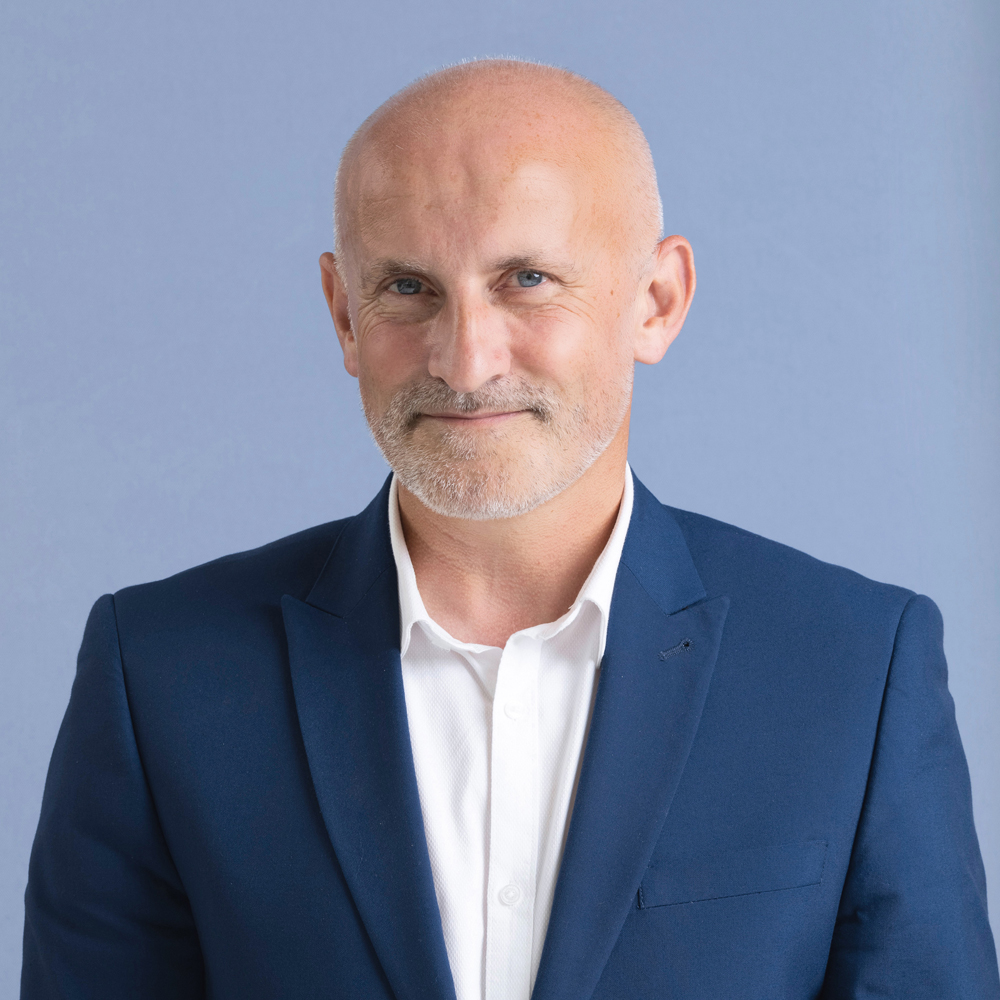
Name: Shayne Caple
Job title: Head of Underwriting Services
To speak to the Pro Global team please feel free to reach out to us at:

To contact our PR team directly please use the link below
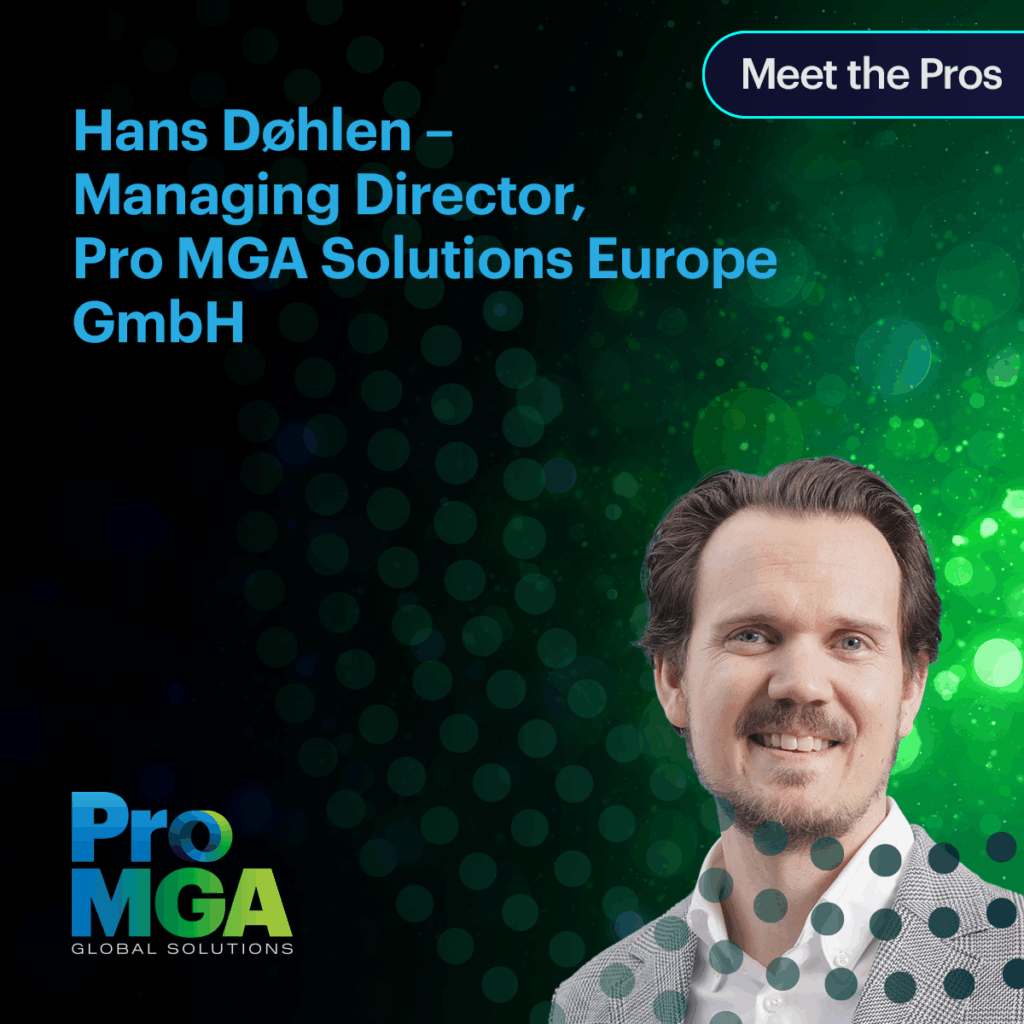
Since joining Pro on 1st November 2023, Hans has been leading the charge for our European MGA growth, combining his underwriting expertise with a track record of entrepreneurial thinking. With 18 years in the industry, Hans is known for pushing boundaries, including the creation of the world’s first “Shareholder Activist Protection Insurance.”
A passionate advocate for insurance innovation and the digitisation of underwriting, Hans brings deep market insight, a love of tech, and an international mindset to the Pro team. We caught up with him to talk about the MGA landscape across Europe, and what the future holds.
Q1: You’ve been with Pro MGA Solutions Europe since 2023. What has stood out most in your experience working with ambitious MGAs so far?
“It’s been a mix of impressions, but overwhelmingly positive. What really stands out is the curiosity – the genuine eagerness from MGA start-ups to make a meaningful difference in the industry. I find it incredibly energising to work with clients who are pushing boundaries and challenging the norm.
Another standout is the talent. It’s fascinating to see how MGAs are now a magnet for top industry professionals. There’s a real shift happening, and MGAs are increasingly seen as the speedboats of the insurance industry – agile, innovative, and fast-moving.
There’s also a great deal of persistence. Many underestimate the complexity of getting an MGA off the ground. It’s a process that demands serious heavy lifting, aligning building blocks, navigating regulation, structuring the proposition, but it’s also hugely rewarding. I often say the industry should show more gratitude and support to MGAs. After all, they’re entrepreneurial ventures at heart and deserve recognition and backing from wider insurance stakeholders.
Lastly, innovation has been a key theme. I’ve learned so much from our clients and truly admire their drive to do things differently. But let’s be honest – insurance is a traditionalist space, and pushing through innovation can be tough. The market likes to hear new ideas, but translating that into real investment and delegated authority is another challenge altogether. It takes courage, and conviction.”
Q2: What do you think sets the European MGA market apart from other regions?
“What makes Europe so unique is that it’s not one unified market, it’s a patchwork of individual countries, each with its own regulatory framework, business culture, and market dynamics. That makes it both complex and incredibly diverse.
There’s often a perception that the European MGA space is unstructured, and in some ways that’s true – unlike the US or UK, there isn’t one central driver. Each market functions as its own ecosystem. That said, we’re seeing real progress. For a long time, the European MGA sector was a bit of a ‘black box,’ lacking transparency and data. That made investors and insurers hesitant to engage. But now, thanks to emerging data sources, we’re getting better visibility and understanding, and that’s breaking down barriers.
We’ve long seen how data has supported MGA growth in the US; it’s helped to ‘oil the wheels’ of the sector. We’re finally seeing similar developments in Europe, and that’s opening up more opportunity.
There are also some standout markets paving the way. In the Netherlands, for example, MGAs account for up to a third of the total market. That sets a powerful example for what’s possible.
Personally, I’d love to see an organisation like the MGAA (Managing General Agents’ Association) take root in Europe. And the momentum is building – the first European MGA Summit generated a great deal of interest and energy. It’s clear there’s appetite for a more unified voice for MGAs across the continent.”
Q3: The MGA space is evolving fast – what do you see as the biggest challenges and opportunities in the European MGA sector right now?
“By nature, I’m an optimist; so let me start with the opportunities, which far outweigh the challenges. There’s a real sense of momentum in the European MGA space right now.
Recent figures show around 20% year-on-year growth for MGAs across Europe, and there’s no sign of that slowing down. That’s a clear indicator of the strength and appeal of the model.
At the same time, insurers are facing increasing pressure to grow – and it’s becoming clear that internal growth alone won’t be enough to meet their targets. That creates a huge opportunity for MGAs to step in and fill the gap, offering agility, innovation and distribution reach that carriers often struggle to replicate in-house.
What’s also encouraging is that MGAs are no longer seen as a niche or second-tier option. In most markets, they’ve moved from being the new kids on the block to fully accepted players. The reputational doubts of the past have largely faded; today, MGAs are recognised as essential engines of growth and innovation for the industry.
It really feels like we’ve moved from the ‘black box’ perception to something more like a ‘fish tank’ – stakeholders are peering in with curiosity and respect, genuinely intrigued by what MGAs are building.
Of course, there are still challenges. The P&C market is softening, and historically that’s made things harder for MGAs, as carriers tend to tighten control of delegated authority. That said, I believe we’re in a different era now. Insurers have matured their MGA strategies and are less reactive, which could help stabilise the impact.
We’re also seeing more rigorous due diligence from carriers when onboarding new MGAs. While that’s understandable, it does stretch timelines and demands significant resources; a burden that often falls squarely on the MGA. Capacity remains both vital and still at times hard to secure.
And then there’s investment. While proven MGA models are still attracting attention, it remains a challenge for very early-stage or pre-seed ventures to secure their first funding. Convincing investors at that stage can be a tough talk – and an even tougher walk.”
Q4: Building on that, you’ve long been a champion for Insurtech – how do you see tech and data shaping the MGA value chain in the next five years?
“There’s an enormous opportunity here, and I think we’re just at the beginning of what’s possible. My hope is that in the coming years, we’ll see tech and data take off in ways that truly transform how MGAs operate, particularly when it comes to underwriting.
I’m especially excited about the potential to digitise underwriting as a core process. Right now, a lot of underwriting still relies on manual inputs and legacy systems. But by pairing smart data with technology, MGAs can move toward a model where underwriting becomes a streamlined, digital process.
We’ll start to see more sophisticated algorithms that don’t replace the underwriter, but enhance their decisions. The underwriter’s role will shift from data analyst to strategic risk assessor, leveraging insights from structured data to make more confident, informed decisions.
The big carriers often move like oil tankers; slow to adapt, slow to innovate. That creates a real window of opportunity for MGAs to lead the charge. If they can think outside the box and embrace new tools, MGAs can truly redefine the value chain and set a new standard for the industry.”
Thanks for your insights, Hans. We’re excited to have you leading the charge in Europe and helping shape the future of MGA innovation at Pro.
Find out more: https://pro-global.com/pro-mga/

Name: Hans Martin Døhlen
Job title: Managing Director, Pro MGA Solutions Europe Gmbh
To speak to the Pro Global team please feel free to reach out to us at:

To contact our PR team directly please use the link below
In dieser Ausgabe von Lernen Sie die Profis kennen sprechen wir mit Oliver Schippa, Head of Product für Deutschland, über seine Rolle, den sich wandelnden Markt für Berufsunfähigkeitsversicherungen und die größten Wachstumspotenziale.
Als Head of Product ist Olivers Rolle sowohl strategisch als auch kooperativ. Er konzentriert sich darauf, das Produkt- und Serviceportfolio von Pro Global in Deutschland weiterzuentwickeln und zu optimieren, während er eng mit den Verantwortlichen insbesondere für die Leistungsprüfung zusammenarbeitet, um gemeinsame Ziele abzustimmen. Kein Tag gleicht dem anderen. „Hier herrscht ein echter Start-up-Geist“, sagt Oliver. „Ein Tag kann damit verbracht werden, Markttrends vorauszudenken, der nächste mit der Optimierung von IT-Systemen, Prozessen oder Kontrollmechanismen. Es ist abwechslungsreich, dynamisch und sehr erfüllend.“

Ein sich wandelndes Marktumfeld
Der Markt für Berufsunfähigkeitsversicherungen in Deutschland hat sich in den letzten Jahren stark verändert. Laut Oliver bleibt die Arbeitsbelastung hoch und erfordert ein zunehmendes Maß an Spezialisierung. Die Gewinnung neuer Talente bleibt eine Herausforderung, weshalb der Fokus verstärkt auf technologischen Lösungen liegt. „KI und moderne Leistungsprüfungssysteme sind heute unverzichtbar“, erklärt er. „Auch die Versicherer treiben Innovationen in ihren Produkten voran, um sich im Wettbewerb zu differenzieren.“
Oliver betont das schwierige Gleichgewicht im Berufsunfähigkeits-Management: „Hinter jedem Fall steht ein kranker Kunde, der auf seine Leistungen angewiesen ist – gleichzeitig ist die Prüfung der Ansprüche für Versicherer äußerst komplex und zeitaufwendig.“ Erschwerend kommt der Fachkräftemangel hinzu sowie Reibungen, die durch notwendige, aber strenge Datenschutz- und IT-Sicherheitsvorgaben entstehen. „Diese Hürden können Innovationen bremsen – aber als Dienstleister sehen wir darin auch die Chance, eine Vorreiterrolle einzunehmen“, sagt er.
Chancen am Horizont
Während Künstliche Intelligenz zweifellos das Thema der Stunde ist, sieht Oliver auch sehr großes Potenzial in der vollständigen Digitalisierung. „KI kann auf jeden Fall unterstützen – besonders bei der Analyse der oft hunderte Seiten umfassenden Dokumentation in einem Leistungsfall“, sagt er. „Aber die vollständige Digitalisierung des Prozesses, um das Kundenerlebnis zu verbessern und die Kommunikation zu beschleunigen, ist der Schlüssel für echte Differenzierung im Markt.“
Mehr über Pro Global Deutschland erfahren und bei Fragen gerne melden:
https://pro-global.com/contact-us/
To speak to the Pro Global team please feel free to reach out to us at:

Name: Oliver Schippa
Job title: Head of Product

To contact our PR team directly please use the link below
In this edition of Meet the Pros, we catch up with Oliver Schippa, Head of Product for Germany, to learn more about his role, the evolving occupational disability market, and where he sees the biggest opportunities for growth.
As Head of Product, Oliver’s role is both strategic and collaborative. He’s focused on developing and refining Pro Global’s product and service portfolio in Germany, while working closely with the Heads of Claims and Client Engagement to ensure alignment on common goals. No two days are the same. “There’s a real start-up spirit here,” Oliver says. “One day might be spent anticipating market trends, the next optimising IT systems, processes, or control mechanisms. It’s varied, fast-paced, and rewarding.”

A Changing Market Landscape
Germany’s occupational disability market has undergone significant shifts in recent years. According to Oliver, the workload remains high and demands a growing level of specialisation. Recruiting new talent continues to be a challenge, which is driving a strong focus on technological solutions. “AI and modern claims management systems are now critical,” he explains. “Insurers are also pushing innovation in their products to gain a competitive edge.”
Oliver is quick to point out the balancing act involved in disability claims management. “Every case involves a sick customer who relies on their benefits, but the process of assessing claims is highly complex and time-consuming for insurers.” Adding to the challenge is the continued difficulty in attracting skilled staff and the friction created by necessary but strict data protection and IT security requirements. “These hurdles can slow innovation, but as a service provider, we see this as an opportunity to lead the way,” he says.
Opportunities on the Horizon
While AI is the obvious innovation everyone’s talking about, Oliver believes the real potential lies in end-to-end digitalisation. “AI can certainly help, especially when analysing the hundreds of pages that often come with a claim,” he says. “But digitalising the entire process, to improve customer experience and speed up communication, is where insurers can really stand out.”
Find out more about Pro Global Germany and get in touch with any queries: https://pro-global.com/contact-us/
To speak to the Pro Global team please feel free to reach out to us at:

Name: Oliver Schippa
Job title: Head of Product

To contact our PR team directly please use the link below
At Pro Global, our people are our greatest asset, and today, we’re celebrating a major milestone in our continued growth. Our German team now comprises more than 60 qualified professionals working in the field of claims management, from our headquarters in Cologne, Germany and located throughout Germany. This isn’t just a headcount milestone, it’s a reflection of how demand for our specialist services is accelerating as the German insurance market faces rising complexity, heightened regulatory scrutiny, and greater expectations from policyholders.
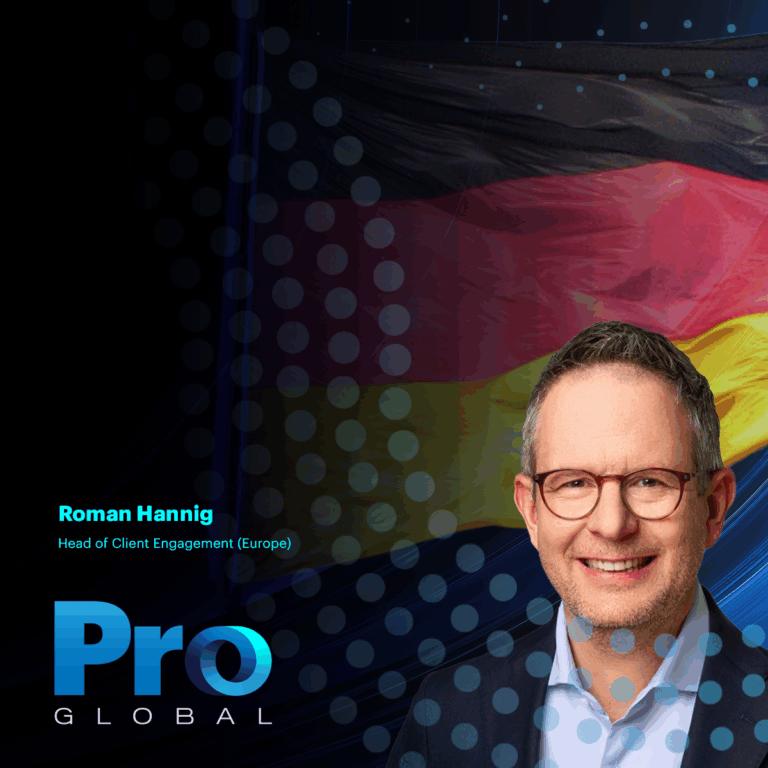
Scaling with Purpose
Germany has long been a core market for Pro Global, but we’re now entering a new phase of expansion. As demand for our services grows, particularly in the highly nuanced areas of occupational disability claims, we are investing heavily in people, processes, and technology to meet it head-on.
What sets us apart is not just the size of our team, but the unique combination of local market knowledge and global expertise we bring to every client engagement. Our specialists understand the intricacies of the German legal, regulatory, and operational environment, while also drawing on Pro Global’s broader capabilities in advanced data analytics, product development, and insurance technology from across our international business.
This blend of local insight and global reach allows us to design tailored solutions that help (re)insurers not only manage claims more effectively, but also unlock strategic value in the process, from improving operational resilience to achieving stronger compliance outcomes.
Our Unique Advantage
As the new Head of Client Engagement in Germany, my focus is on helping our clients transform the way they approach complex claims, making the process faster, and more transparent for all stakeholders. In a fast-evolving occupational disability insurance landscape, that means moving beyond traditional claims handling and embracing a more dynamic, tech-enabled model.
What makes Pro Global truly unique in Germany is our ability to integrate claims excellence with cutting-edge innovation and deep local expertise and regulatory know-how. Our team doesn’t operate in silos, we work in close collaboration with our international colleagues across technology, data, and compliance to offer a truly holistic service.
We’re not just another outsourced claims team. We’re a strategic partner helping clients solve complex problems, adapt to market change, and deliver meaningful outcomes for policyholders. Whether you’re a domestic insurer looking to boost efficiency, or an international player entering the German market, our combined experience and scalable model can help you operate more effectively, fairly, and compliantly.
Looking Ahead
Our 60+ strong team in Germany is more than a number, it’s a powerful symbol of our ambition, capability, and commitment to the market. As we continue to invest in our people and solutions, we look forward to deepening our partnerships with (re)insurers across Germany and beyond.
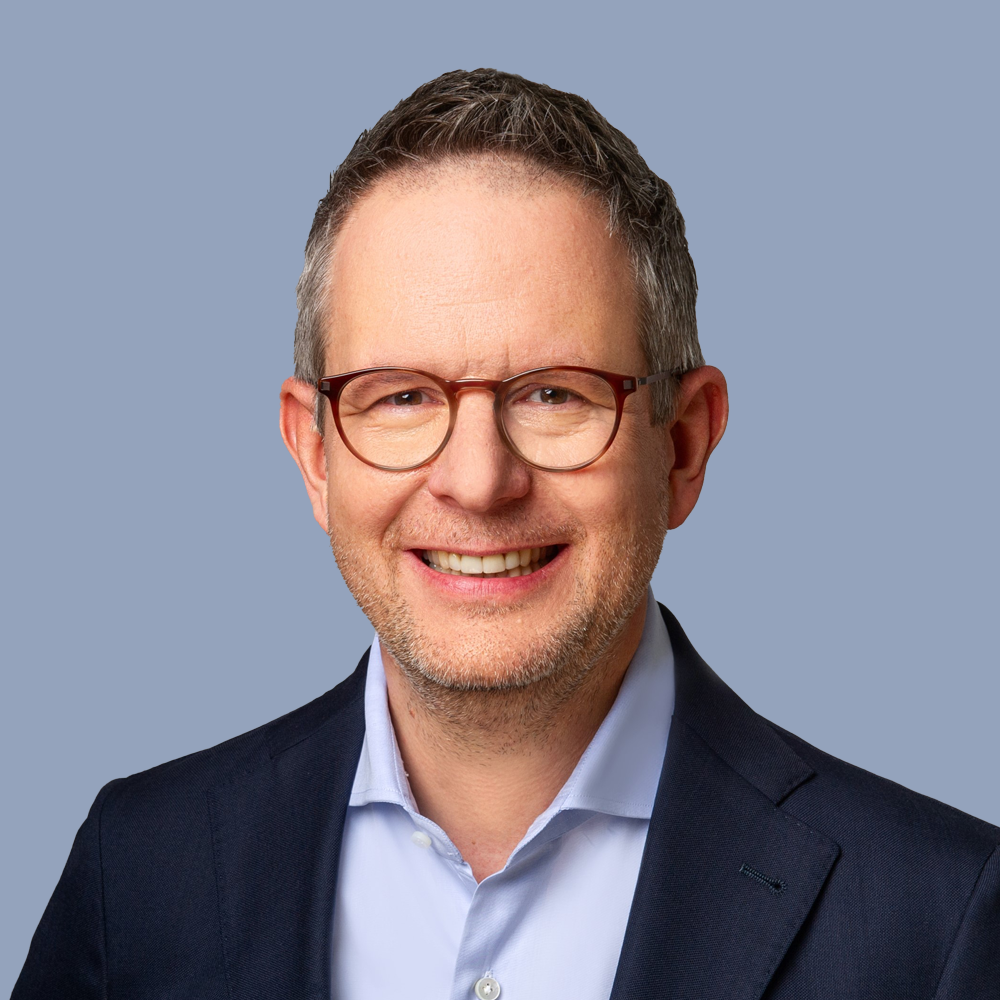
Name: Roman Hannig
Job title: Head of Client Engagement
To speak to the Pro Global team please feel free to reach out to us at:

To contact our PR team directly please use the link below
Bei Pro Global sind unsere Mitarbeitenden unser größtes Kapital – und heute feiern wir einen wichtigen Meilenstein in unserer kontinuierlichen Wachstumsreise. Unser deutsches Team besteht mittlerweile aus über 60 qualifizierten Fachkräfte im Schadenmanagement – an unserem Standort in Köln und über ganz Deutschland verteilt. Das ist nicht nur eine Zahl – es ist ein Zeichen dafür, wie stark die Nachfrage nach unseren spezialisierten Dienstleistungen wächst, während sich der deutsche Versicherungsmarkt mit einer wachsenden zunehmenden Komplexität, verschärften regulatorischen Anforderungen und gestiegenen Erwartungen seitens der Versicherungsnehmer konfrontiert sieht.

Gezieltes Wachstum mit Weitblick
Deutschland ist seit jeher ein Kernmarkt für Pro Global. Nun treten wir in eine neue Phase unserer Expansion ein. Die stark zunehmende Nachfrage nach unserem Know-how – insbesondere in den anspruchsvollen Bereichen der Berufsunfähigkeits- und Grundfähigkeitsversicherung – unterstreicht unsere führende Rolle in einem dynamischen Marktumfeld. Um dieser Entwicklung gerecht zu werden, investieren wir gezielt in unsere Mitarbeitenden, in optimierte Prozesse und in moderne Technologien.
Was uns wirklich auszeichnet, ist nicht nur die Größe unseres Teams, sondern die besondere Kombination aus tiefem lokalen Marktverständnis und internationaler Expertise, die wir in jedes Kundenprojekt einbringen. Unsere Spezialist*innen kennen die Feinheiten des deutschen rechtlichen, regulatorischen und operativen Umfelds und greifen gleichzeitig auf Pro Globals umfassende Kompetenzen in den Bereichen Datenanalyse, Produktentwicklung und Versicherungstechnologie auf internationaler Ebene zurück.
Diese Kombination aus lokaler Expertise und globaler Reichweite ermöglicht es uns, maßgeschneiderte Lösungen zu entwickeln, mit denen (Rück-)Versicherer nicht nur ihre Schadenprozesse effizienter gestalten, sondern auch strategischen Mehrwert schaffen können – von der Stärkung der operativen Resilienz bis hin zur Verbesserung regulatorischer Erfüllung.
Unser Alleinstellungsmerkmal
Als neuer Head of Client Engagement setze ich mich dafür ein, gemeinsam mit unseren Kunden innovative Ansätze für die Schadenbearbeitung zu entwickeln – mit dem Ziel, Prozesse zu beschleunigen und die Transparenz für alle Beteiligten deutlich zu erhöhen. Gerade im sich rasant entwickelnden Berufsunfähigkeitsversicherungsmarkt bedeutet das, über klassische Schadenbearbeitung hinauszugehen und ein dynamischeres, technologiegestütztes Modell zu etablieren.
Was Pro Global in Deutschland besonders auszeichnet, ist die Fähigkeit, erstklassige Schadenbearbeitung mit modernster Technologie und tiefgreifender lokaler wie regulatorischer Expertise zu vereinen. Unser Team agiert nicht im Alleingang, sondern arbeitet eng vernetzt mit unseren internationalen Kolleg*innen aus den Bereichen Technologie, Daten und Compliance zusammen – für einen integrierten, ganzheitlichen Serviceansatz.
Wir sind weit mehr als ein ausgelagertes Schadenbearbeitungsteam – wir sind ein strategischer Partner. Mit tiefem Marktverständnis unterstützen wir Versicherer dabei, komplexe Herausforderungen zu meistern, sich an dynamische Rahmenbedingungen anzupassen und echten Mehrwert für Ihre Kund*innen zu schaffen. Ganz gleich, ob Sie Ihre Effizienz steigern oder als internationaler Anbieter erfolgreich in den deutschen Markt einsteigen möchten: Unser erfahrenes Team und skalierbares Servicemodell liefern die Lösung – regelkonform, transparent und wirkungsvoll.
Blick in die Zukunft
Unser Team von über 60 Fachleuten in Deutschland ist weit mehr als eine Zahl – es ist Ausdruck unserer Ambition, unserer Leistungsfähigkeit und unseres leidenschaftlichen Einsatzes für den Versicherungsmarkt. Auch künftig investieren wir gezielt in unsere Mitarbeitenden und technologische Innovationen – mit dem klaren Ziel, unsere Zusammenarbeit mit (Rück-)Versicherern in Deutschland und darüber hinaus nachhaltig auszubauen.

Name: Roman Hannig
Job title: Head of Client Engagement
To speak to the Pro Global team please feel free to reach out to us at:

To contact our PR team directly please use the link below

Compliance remains a moving target, and supervisory scrutiny is intensifying. These are the key takeaways from the European Insurance and Occupational Pensions Authority (EIOPA) 5th Annual Report, launched this year, on administrative sanctions and other measures under the Insurance Distribution Directive (IDD).
With over 1,500 IDD-related sanctions issued across 20 EU/EEA Member States in 2023 alone, insurers and intermediaries are under increasing pressure to embed a customer-centric, risk-aware culture that aligns with both regulatory expectations and market best practices. Monetary penalties imposed for non-compliance amounted to €326,073 in 2023, with temporary bans on management functions applied in some cases.
From our vantage point at Pro Global, the report underlines the critical role of robust governance, proactive oversight, and integrated assurance, which are fundamental principles to our audit and business practices. While the volume of sanctions declined from the previous year, the quality and thematic focus of regulatory actions have shifted, reflecting a more nuanced, principle-based supervisory approach.
The growing focal point of product oversight and governance
A clear trend emerging from the report is the intensified enforcement of Product Oversight and Governance (POG) rules. Breaches related to inadequate target market definition, product testing, and ineffective review mechanisms have increased, with regulators in multiple jurisdictions now imposing cease-and-desist orders and administrative measures for non-compliance.
This shift toward product governance reflects a broader push for customer-centricity and value for money, both cornerstones of the IDD. Insurers and intermediaries must now not only design appropriate products but also continuously demonstrate that those products deliver fair outcomes throughout their lifecycle.
Conduct and organisational standards in the spotlight
The report also highlights persistent breaches of conduct and organisational requirements, particularly under Articles 10 and 17 of the IDD. Many sanctions related to professional and organisational inadequacies, registration failures, and poor complaints handling. Furthermore, Article 17, requiring firms to act honestly, fairly, and professionally in the customer’s best interest, is increasingly cited in enforcement cases.
While not formally considered an IDD breach, a notable example from France illustrates regulators’ focus on conduct and transparency in non-life distribution. According to a report published on 21 June 2023 by the French Consumer Protection Authority, 49 sanctions were imposed after the investigation of 147 insurance distributors.
Breaches included misleading practices related to phone canvassing, legal fees insurance coverage, and incomplete refunds following the early cancellation of insurance contracts. Though these sanctions were imposed under national consumer protection rules and are not included in the official IDD figures, they underscore the growing scrutiny of sales practices and the importance of providing clear, complete, and accurate information to consumers, particularly in non-life insurance lines.
How Pro Global can support you
At Pro Global, we specialise in helping insurers and intermediaries anticipate and exceed regulatory expectations as they grow and develop their business. Our Audit team brings deep expertise in multit-territory insurance governance, compliance, and risk assurance, offering independent assessments, targeted reviews, and full-service co-sourced or outsourced audit support.
We help you identify and address gaps in your IDD compliance framework, enhance your and your intermediaries’ POG arrangements, and align your audit function with evolving regulatory priorities. Whether you’re preparing for a supervisory review or building out your internal assurance capabilities, our tailored solutions provide confidence, clarity, and compliance.
A strong, independent audit function is a strategic enabler. It builds resilience, enhances stakeholder confidence, and provides the clarity and assurance needed to grow sustainably in a complex environment. If you’re ready to move from compliance firefighting to proactive governance that adds value, our Audit & Advisory team is here to help you lead from a position of strength.
Contact Pro Global’s Audit team today to discuss how we can strengthen your compliance framework and enhance stakeholder trust: getintouch@pro-global.com
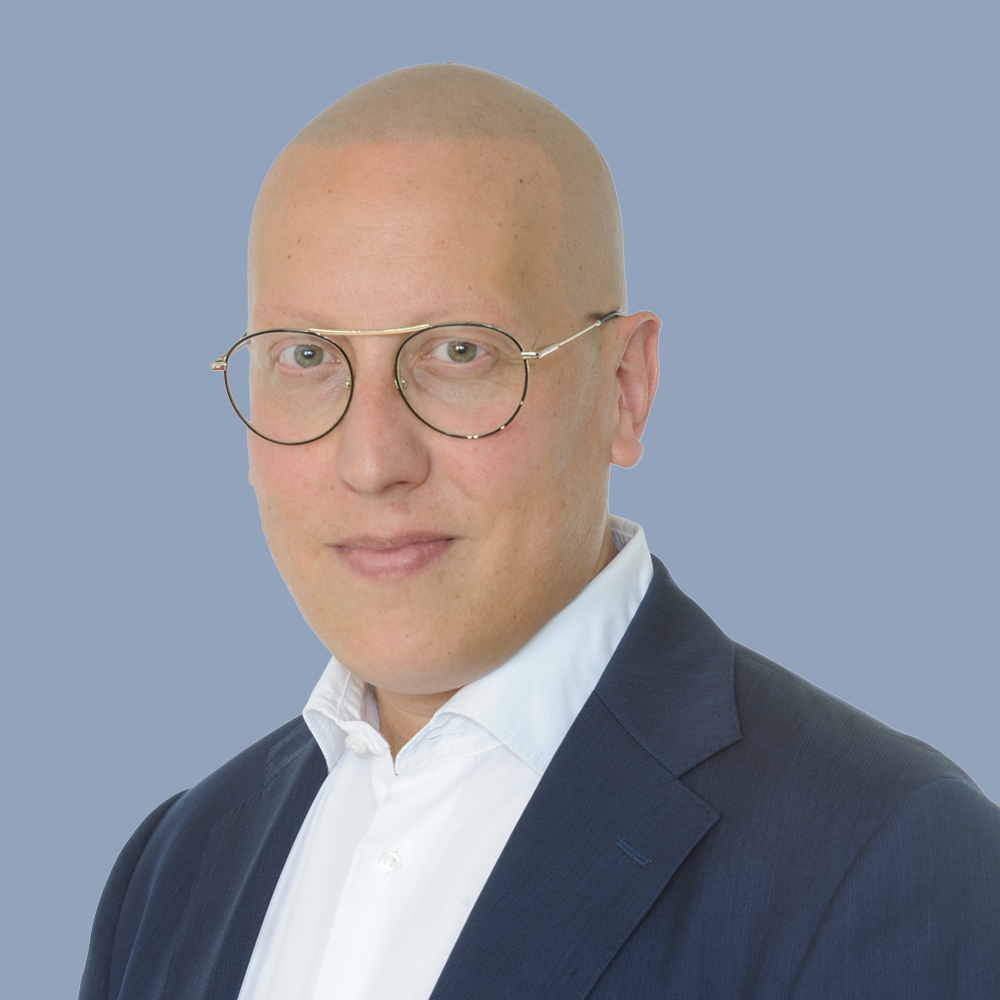
Name: Francesco Rastrelli
Job title: Senior Auditor
To speak to the Pro Global team please feel free to reach out to us at:

To contact our PR team directly please use the link below
Clearwater is on a mission to redefine marine insurance through the fusion of technology, expertise, and global market insight. Its strength lies in navigating complex marine risks with agility, and in building long-term client relationships based on trust, innovation, and tailored solutions.
Pro MGA Global Solutions recently caught up with Rob Earrey and James Harris Founders of InterProtect and Swati Panesar, the Chief Operating Officer of Clearwater UW Ltd to discuss the company’s vision, its innovative new product InterProtect, and how Pro MGA has supported its growth journey.

Rob: “InterProtect was born from the recognition that rapidly evolving industries, like subsea infrastructure, deserve a dedicated insurance provider focused solely on their needs. We saw a clear gap for an agile, specialist insurer that could offer bespoke coverage while also raising the bar on risk management standards. From our experience in broking and underwriting, it was evident the subsea cable insurance market lacked stable leadership. Historically, the class has suffered from fragmentation, with markets entering opportunistically, often without the necessary experience, and exiting just as quickly when conditions shifted. This volatility eroded client confidence and made placement increasingly inefficient.
We wanted to create a stable, high-capacity offering grounded in expertise, one that serves client interests over the long term and streamlines the placement process. London needed a dedicated carrier with cable-specific knowledge, and InterProtect is our answer to that call.”
James: “Our differentiator is simple: true subject matter expertise and efficient service delivery. We understand the nuances of subsea cable risks and can ask the right questions at the right time, enabling us to provide clarity and speed where others may hesitate.
We offer tailored, high-capacity coverage supported by cutting-edge technology and backed by deep marine insurance experience. This means our clients don’t have to juggle multiple insurers or engineering departments, they get a single, expert point of contact with placement certainty.
In a sector that’s growing in scale and complexity, our understanding of the maritime domain and our ability to translate that into effective underwriting gives us a distinct and valuable edge.”
Rob: “Our ideal clients include cable owners, operators, investment consortiums, and marine contractors involved in subsea cable projects. We provide bespoke, project-specific insurance backed by real industry insight.
But our support doesn’t stop at placement. We offer post-inception risk reviews with asset management recommendations, and we create bespoke scopes of work for marine warranty surveyors tailored to our clients’ projects, not repurposed offshore wind templates. We also offer broader protection, such as Cargo War cover for cable shipments.
Looking ahead, we plan to enhance our value even further by offering Raptor/AIS vessel tracking capabilities, engaging actively in industry discussions around cable protection, and partnering with cable monitoring and repair firms to offer clients a truly comprehensive risk solution.”
James: “We believe the market will welcome InterProtect as a much-needed, dedicated player in this niche. Our traditional MGA model, combined with our clear focus on improving industry standards, gives us credibility.
Our risk philosophy and engineering-led cost modelling offer reassurance that we’re not here for short-term gain, we’re building a sustainable proposition. Our goal is to become the preferred leader in this class, and with the team and partners we have, we’re confident that’s within reach.”
Swati: “Pro MGA Global Solutions has been instrumental in Clearwater’s success to date. Their deep expertise in regulatory compliance and governance gave us a strong foundation from day one, helping us meet complex requirements with clarity and confidence.
They’ve been more than just an oversight partner, they’ve offered practical, strategic guidance as we scaled. During the launch of InterProtect, their operational support was critical. Thanks to their robust framework, we were able to bring a technically complex product to market efficiently and with confidence.
Their partnership allows us to focus on innovation and growth, knowing we have an experienced, trusted team supporting us behind the scenes.”
Thank you to Swati Panesar and the team at Clearwater UW for sharing their insights.
To find out how Pro MGA Global Solutions can support your MGA journey: get in touch with our team today. We’d love to help bring your vision to market: https://pro-global.com/pro-mga/
To speak to the Pro Global team please feel free to reach out to us at:

To contact our PR team directly please use the link below